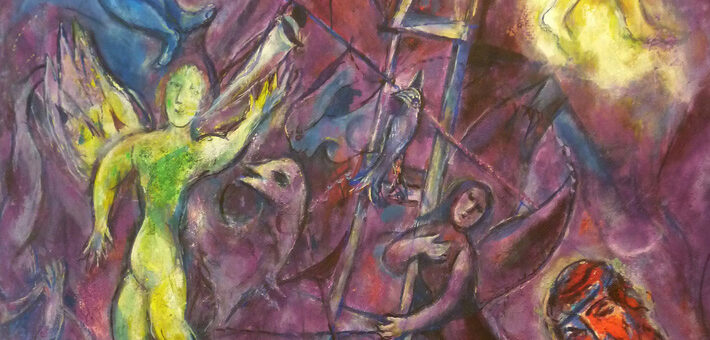Commentary on Isaiah 44:6-8
The prophet’s preaching is focused on God’s being.
Who is this Yhwh in a world whose horizon is filled with so many possible objects of worship — so many other gods? There are two complementary bits of this little text: the prophet’s witness (verse 6a) and Yhwh’s self-revelation (verses 6b-8).
The prophet introduces the divine utterance by drawing attention to who the speaker really is: “Thus says the LORD, the King of Israel, and his Redeemer, the LORD of hosts” (Isaiah 44:6a). The speaker being introduced is not playing second fiddle in the cosmic orchestra. Rather, Yhwh is introduced as both first chair and conductor — the one and only. Yhwh is King, Redeemer, and Lord of hosts.
References to Yhwh as “King of Israel” are infrequent with only one outside of Deutero-Isaiah.1 Given that there are no gods over whom Yhwh might reign,2 this kingship is directed at humanity and the cosmos as a whole. Yhwh is also redeemer of Israel. This is not so unique. The Lord Redeemer who speaks to the exiles in Babylon is the same Lord who redeemed their ancestors from the grips of slavery in Egypt.3
Though the image of Yhwh as Redeemer is not so unique, the point is not diluted: Yhwh alone saves.4 And to boot, Yhwh is also Lord of hosts. In a chaotic world where evidence of Yhwh’s place as King and/or Redeemer is in short supply save for the power of memory and promise, the promise that this one God is also Lord of hosts fuels a faithful imagination to see chaos and suffering against a alternative horizon where Yhwh is the final power and authority. Life’s ultimate horizon is not the displacement and subjugation of the present. This is only penultimate. That Yhwh is Lord of hosts suggests that life’s ultimate horizon is lived within the cosmos where Yhwh is King and Redeemer.
All of this introduces the plenary address5 — a speech that is dense and to the point.
Yhwh declares, “I am the first and I am the last; besides me there is no other god” (Isaiah 44:6b). The speech is summarized with these two phrases. In short, there is no other viable object of worship. There is no other source of life. There is no other King. There is no other Redeemer. There is no other Lord of hosts. “You shall have no other gods before me.”6
Against the horizon where there are many “options” for worship, the radicalness of Deutero–Isaiah’s monotheism is crystal clear here.7 In fact, Yhwh moves into a kind of throw down8 with anyone who would say otherwise. “Who is like me? Let them proclaim it, let them declare and set it forth before me. Who has announced from of old the things to come? Let them tell us what is yet to be” (Isaiah 44:7).
Of course, there is no one who pipes up. No one — god or human — answers Yhwh’s questions. Into this silence, Yhwh proclaims, “Do not be frightened, do not be shaken” (Isaiah 44:8a, JPS). Silence in the face of Yhwh’s questions is not a dangerous place. Rather, it directs the witnesses back toward the living God — King, Redeemer, and Lord of hosts — the Rock9, besides whom there is no other.
Of the many directions that this text could take the preacher and her hearers, two stand out. The first relates the question that begins this commentary: Who is this Yhwh in a world whose horizon is filled with so many possible objects of worship — so many gods? This question is as contemporary as ever. The world in which we live is wrought with objects demanding our devotion. These other objects, which we can all name and find in relation to ourselves and those whom we are called to serve, inspire fear … fears of death, inadequacy, alienation, being in control, being out of control, etc …
These fears, often awakened and fueled by strong messages from outside of ourselves, demand devotion. Yet, Yhwh — King, Redeemer, and Lord of hosts — the beginning and the end — directs our attention and our devotion away from these empty things, away from these empty pursuits back toward the only one who saves, back toward the only source of life. “I am the first and I am the last, besides me there is no god … Fear not, and do not be afraid.”
A second and related direction that this text might take the preacher is toward the particularly Christian incarnation of this “first-ness” and “last-ness.” Within the horizon of Isaiah 44:6 is the witness to the Jesus Christ’s first-ness and last-ness in Revelation, in particular the declaration of crucified and risen Lord: “Fear not, I am the first and the last, and the living one; I died, and behold I am alive for evermore, and I have the keys of Death and Hades.”10
Here the author of The Revelation to John includes the identity of Jesus Christ within Yhwh, the God of Israel. “It does not designate [Jesus Christ] a second god, but includes him in the eternal being of the one God of Israel who is the only source and goal of all things.”11 This sharpens our focus toward the Christian proclamation of Jesus Christ — King, Redeemer, and Lord of hosts — who by his death conquered death and hell.
Notes:
1 Isaiah 41:21 [King of Jacob], 43.15; and Zepheniah 3.15.
2 Isaiah 44.6b. Note also that Isaiah 44.9-20 is a rail against the absurdity of idolatry, including the rather humorous illustration that the same trees used for keeping warm and baking are used to fashion idols to which people direct their prayers of deliverance: “Deliver me, for you are my god!”(Isaiah 44.17b).
3 Exodus 15:3. The memory of Israel’s redemption fuels the corporate relationship between God and God’s people, e.g., Psalms 77.16, 78.35, 106.10. Yhwh’s redeeming activity also defines the personal relationship between God and the individual, e.g. Job 19.25, Psalm 19.14.
4 E.g., Psalm 69.18.
5 In form, Yhwh’s speech resembles an opening argument in a trial, cf. Klaus Baltzer, Deutero-Isaiah (Margaret Kohl, trans.; Hermeneia; Minneapolis: Fortress, 2001) 188.
6 Exodus 20:3, Deuteronomy 5:7.
7 While the emphasis in Isaiah 44:6-8 is on the radical oneness of Yhwh’s being, Isaiah 45:5-7 rounds out this radical monotheism from the vantage of who God is and what God does.
8 Though far more succinct, there is a resemblance between this throwdown and Yhwh’s questioning of Job out of the whirlwind, insofar as both questions invite a witness to that which is only available to Yhwh.
9 Psalms 18.2, 19.15, 92.15, etc.
10 Revelation 1:17, RSV. The first/last formula also occurs in Revelation 2:8, 21:6, and 22:13.
11 Richard Bauckham, The Theology of the Book of Revelation (New Testament Theology; Cambridge: Cambridge Univ. Press, 1993) 58.


July 20, 2014